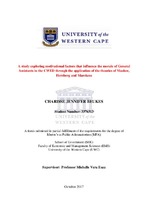A study exploring motivational factors that influence the morale of General Assistants in the CWED through the application of the theories of Maslow, Herzberg and Marciano
Abstract
The purpose of this study is to identify and explore factors that influence the morale of
general assistants in the Cape Winelands Education District (CWED) through a qualitative
study at five schools in Worcester. General assistants are perceived as low-skilled workers
due to the content of the functions they fulfill at educational institutions. The Needs Theory
of Maslow, the Two-factor Theory of Herzberg and the Respect Model of Marciano provide
the theoretical context for the study. A qualitative approach was followed by conducting oneon-
one structured interviews with principals and general assistants at the identified schools.
The goal was to determine how attitudes and behaviour of some stakeholders at the
educational institution had an impact on the morale of the general assistants. Some of the
main findings that resulted from interviews revealed that general assistants have been
employed at schools for long periods, ranging from one to more than twenty years. The
majority of the participants indicated that they were content with their salary and leave
allocation. The factors that influenced their morale positively were identified as the
relationship and communication with the principal, friendliness and respect by colleagues and
the opportunities to grow and develop. Factors that influenced their morale adversely, were
negative and disrespectful behaviour displayed by learners, disrespect by colleagues,
including educators and situations of conflict.

